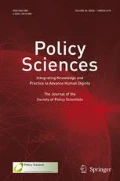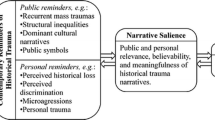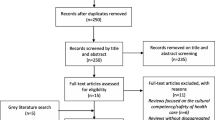Abstract
In this paper, we explore paradoxes and contradictions in Canadian health policy discourses that define Aboriginal women as empowered citizens on the one hand and as discredited medical subjects on the other. Drawing on critical discourse theory, we analyze health policy discourses within the contexts of related political and public discourses about Aboriginal peoples in Canada. We describe a double-speak: a paradox between the constructions of Aboriginal women as citizens in dialogue with government in health policy “reforms,” and their construction as discredited medical subjects who lack legitimacy in health care services. Intertwined with explicit resistance to Aboriginal entitlements, deconstruction of health policy discourses within this political context is central to understanding how Aboriginal women continue to be discredited through processes of marginalization.
Similar content being viewed by others
References
Aboriginal Governors Working Group (1999). Achieving a Balance of Wellness for all British Columbians: Aboriginal People and Regionalization. Victoria, BC: Government of British Columbia Ministry of Health.
Aboriginal Nurses Association of Canada (2002). Exposure to Violence in the Home: Effects on Aboriginal Children. Ottawa, ON: Author.
Bonneau, T. (1999). ‘The Nisga'a Treaty: One step closer or two steps back? Nisga'a First Nation Treaty negotiations with the federal and provincial governments, Aboriginal title,’ Aboriginal Voices 6(2): 32–35.
Browne, A. J. (2003). First Nations Women and Health Care Services: The Sociopolitical Context of Encounters with Nurses. Unpublished Doctoral Dissertation, University of British Columbia, Vancouver, BC.
Browne, A. J. (2005). ‘Discourses influencing nurses’ perceptions of First Nations patients,’ Canadian Journal of Nursing Research 37(4): 62–87.
Browne A. J. and J. Fiske (2001). ‘First Nations women's encounters with mainstream health care services,’ Western Journal of Nursing Research 23: 126–147.
Browne, A. J., J. Fiske and G. Thomas (2000). First Nations Women's Encounters with Mainstream Health Care Services and Systems. Vancouver, BC: BC Centre of Excellence for Women's Health.
Browne, A. J. and V. Smye (2002). ‘A postcolonial analysis of health care discourses addressing Aboriginal women,’ Nurse Researcher: The International Journal of Research Methodology in Nursing and Health Care 9(3): 28–41.
Codd, J. (1988). ‘The construction and deconstruction of educational policy documents,’ Journal of Education Policy 3: 235–247.
Commission on the Future of Health Care in Canada (2002a). Backgrounder: Report on a Citizens' Dialogue on the Future of Health Care in Canada. Available at, http://www.healthcarecommission.ca on 22 July 2002.
Commission on the Future of Health Care in Canada (2002b). Building on Values: The Future of Health Care in Canada, Final Report. Available at http://www.hc-sc.gc.ca/english/care/romanow/hcc0023.html on 15 June 2005.
Dion Stout, M. (1997). ‘Stopping family violence: Aboriginal communities enspirited,’ in J. R. Ponting, ed., First Nations in Canada: Perspectives on Opportunity, Empowerment, and Self-determination. Toronto, ON: McGraw-Hill Ryerson Limited, pp. 273–298.
Farmer, P. (1999). Infections and Inequalities: The Modern Plagues. Berkeley: University of California Press.
Farmer, P. (2003). Pathologies of Power : Health, Human Rights, and the New War on the Poor. Berkeley: University of California Press.
First Nations and Inuit Health Branch (2002). Mandate and Priorities. Available at http://www/hc-sc/gc/ca/fnihb/mandate_priorities.htm on 17 February 2002.
Fiske, J. (1996). ‘The womb is to the nation and the heart is to the body: Ethnopolitical discourses of the Canadian indigenous women's movement,’ Studies in Political Economy 51: 65–95.
Foucault, M. (1980). Power/knowledge: Selected Interviews and Other Writings 1972-1977. New York: Pantheon Books.
Fraser, N. and L. Gordon (1994). ‘A genealogy of “dependency”: Tracing a keyword of the US welfare state,’ Signs: A Journal of Culture and Society 19: 310–336.
Furniss, E. (1999). The Burden of History: Colonialism and the Frontier Myth in a Rural Canadian Community. Vancouver, BC: University of British Columbia Press.
Good, B. (1994). Medicine, Rationality and Experience: An Anthropological Perspective. Cambridge: Cambridge University Press.
Government of British Columbia Ministry of Communities, Aboriginal Affairs and Women's Services (2001). UBCM Resolutions and Responses. Available at http://www.mcaws.gov.bc.ca/lgd/pol_research/ubcm/2001/b33.htm on 23 October 2002.
Government of British Columbia Ministry of Health Services (2002a). Aboriginal Health Funding. Available at http://www.healthplanning.gov.bc.ca/aboriginal/funding.html on 16 July 2002.
Government of British Columbia Ministry of Health Services (2002b). Aboriginal Health Planning Policy, Requirements and Guidelines 2001-2002. Available at http://www.healthplanning.gov.bc.ca/aboriginal/pdf/AHP-Requirements.pdf on 16 July 2002.
Government of British Columbia Ministry of Health Services (2002c). Provincial Aboriginal Health Services Strategy Workplan Activities 2000–2001. Available at http://www.healthplanning.gov.bc.ca/aboriginal/pahss-workplan2000.html on 16 July 2002.
Heilleiner, J. (2001). “The right kind of children”: Childhood, gender and “race” in Canadian postwar political discourse,’ Anthropologica XLIII : 143–152.
Kleinman, A. (1995). Writing at the Margin: Discourse between Anthropology and Medicine. Berkeley: University of California Press.
Kleinman, A., V. Das, and M. Lock (1997). Social Suffering. Berkeley: University of California Press.
LaRocque, E. (1993). ‘Violence in Aboriginal communities,’ in Royal Commission on Aboriginal Peoples, ed., The Path to Healing: Royal Commission on Aboriginal Peoples. Ottawa, ON: Canada Communications Group Publishing, pp. 72–89.
LaRocque, E. (1997). ‘Re-examining culturally-appropriate models in criminal justice applications,’ in M. Asch, ed., Aboriginal and Treaty Rights in Canada: Essays on Law, Equality and Respect for Difference. Vancouver, BC: University of British Columbia Press, pp. 75–96.
LeMoal, D. (2002a). ‘BC treaty referendum polarizes province,’ The First Perspective, May 1, p. 3.
LeMoal, D. (2002b). ‘Referendum mail-in deadline passes, protest continues,’ The First Perspective, June 1, p. 3.
MacDonald, C. (2003). ‘The value of discourse analysis as a methodological tool for understanding a land reform program,’ Policy Sciences 36: 151–173.
Mackey, E. (1997). ‘Mulitculturalism, constitutional crisis and celebrations: Key aspects of celebratory policy,’ in C. Shore and S. Wright, eds., Anthropology of Policy: Critical Perspectives on Governance and Power. London: Routledge, pp. 136–164.
Malone, R. E. (1999). ‘Policy as product,’ Hastings Centre Report 29(3), 16–23.
Manuel, A. (2005). ‘Grassroots people's coalition and the 5 billion dollar deal,’ The First Perspective, December 6, p. 9.
McConaghy, C. (1997). What ConstitutesToday's Colonialism? Reconsidering Cultural Relevance and Mainstreaming in Indigenous Social and Educational Policy. Reading 4. Unpublished manuscript, UNE Armidale Department of Educational Studies, Armidale, Australia.
McConaghy, C. (2000). Rethinking Indigenous Education: Culturalism, Colonialism and the Politics of Knowing. Brisbane: Post Pressed.
McConney, D. S. (1999). ‘Differences for our daughters,’ Canadian Woman Studies 19: 209–214.
Morrow, M. (2003). Mainstreaming Women's Mental Health: Building a Canadian Strategy. Vancouver, BC: British Columbia Centre of Excellence for Women's Health.
National Obriginal Health Organization (2002). Summary of Romanow Commission's Aboriginal Health Forum. Available at http://www.naho.ca/NAHOwebsite.nsf on 22 July 2002.
Native Youth News (1998). ‘Native youth movement confront BC treaty process as chiefs, negotiators meet with Indian Affairs: The Native youth in British Columbia submit their views of the BC treaty process,’ Native Youth News, February 2, p. 8.
Northern Health Authority (2002). NHA Looking for Projects to Improve Aboriginal Health. Available at http://www.northernhealth.ca on 26 July 2002.
Pearsall, J., ed. (1998). The New Oxford Dictionary of English. Oxford: Oxford University Press.
Poole, N. (2003). Mother and Child Reunion: Preventing Fetal Alcohol Spectrum Disorder by Promoting Women's Health. Vancouver, BC: British Columbia Centre of Excellence for Women's Health.
Razack, S. (1998). Looking White People in the Eye: Gender, Race, and Culture in Courtrooms and Classrooms. Toronto, ON: University of Toronto Press.
Royal Commission on Aboriginal Peoples (1996a). Report of the Royal Commission on Aboriginal Peoples. Volume 3, Gathering Strength. Ottawa, ON: Author.
Royal Commission on Aboriginal Peoples (1996b). Report of the Royal Commission on Aboriginal Peoples. Volume 4, Perspectives and Realities. Ottawa, ON: Author.
Rutman, D., M. Callahan, A. Lundquist, S. Jackson, and B. Field (2000). Substance Use and Pregnancy: Conceiving Women in the Policy-making Process. Ottawa, ON: Status of Women Canada.
Shore, C. and S. Wright, eds. (1997). Anthropology of Policy: Critical Perspectives on Governance and Power. London: Routledge.
Tait, C. (2000a). A Study of the Service Needs of Pregnant Addicted Women in Manitoba. Winnipeg, MB: Manitoba Health.
Tait, C. (2000b). ‘Aboriginal identity and the construction of fetal alcohol syndrome,’ in L. J. Kirmayer, M. E. MacDonald and G. M. Brass, eds., Culture and Mental Health Research Unit Report No. 10. The Mental Health of Indigenous Peoples. Montreal, QC: McGill Queen's University Press, pp. 95–111.
Taylor, S., F. B. Rizvi, Lingrad and M. Henry (1997). Educational Policy and the Politics of Change. New York: Routledge.
van Dijk, T. (1988). News as Discourse. Hillsdale, MI: Lawrence Erlbaum.
Warry, W. (1998). Unfinished Dreams: Community Healing and the Reality of Aboriginal Self-government. Toronto, ON: University of Toronto Press.
Yaffe, B. (1999). ‘Special rights for natives threaten an otherwise civil society,’ The Vancouver Sun, October 23, p. A9.
Yaffe, B. (2002). ‘Attitude ensures natives remain an underclass,’ The Vancouver Sun, July 23, p. A14.
Young. A. (1982). ‘The anthropologies of iIllness and sickness,’ Annual Review of Anthropology 11: 257–285.
Young, A. (1993). ‘A description of how ideology shapes knowledge of a mental disorder (posttraumatic stress disorder),’ in S. Lindenbaum and M. Lock, eds., Knowledge, Power and Practice: The Anthropology of Medicine and Everyday Life. Berkeley: University of California Press, pp. 108–128.
Author information
Authors and Affiliations
Corresponding author
Rights and permissions
About this article
Cite this article
Fiske, JA., Browne, A.J. Aboriginal citizen, discredited medical subject: Paradoxical constructions of Aboriginal women's subjectivity in Canadian health care policies. Policy Sci 39, 91–111 (2006). https://doi.org/10.1007/s11077-006-9013-8
Received:
Accepted:
Published:
Issue Date:
DOI: https://doi.org/10.1007/s11077-006-9013-8




